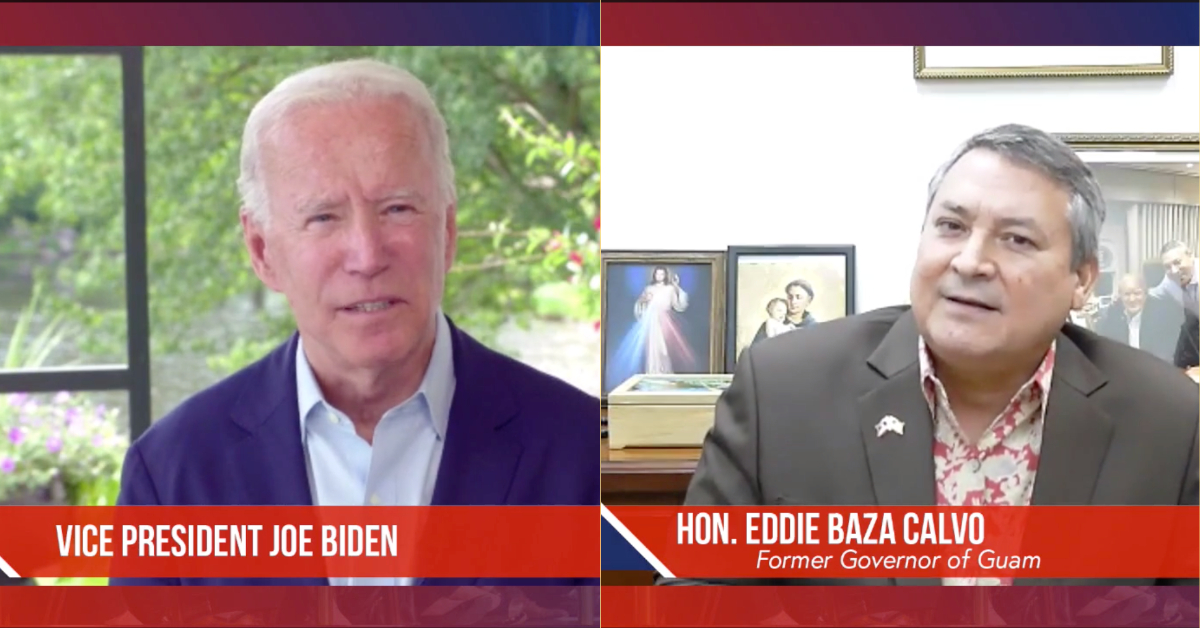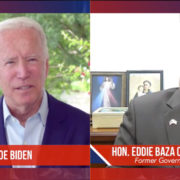
FORMER Vice President Joe Biden and former Guam Governor Eddie Baza Calvo, a surrogate for President Donald Trump, participated in a virtual presidential town hall on Saturday, June 27 to answer questions and address concerns of the Asian American and Pacific Islander (AAPI) community.
The town hall was organized by APIAVote, a national nonpartisan group that works to mobilize the AAPI community in electoral and civic affairs. Vicky Nguyen of NBC News and Amna Nawaz of PBS moderated the event.
Among the key concerns presented was that of race relations, which has been increasingly tested amidst the current Black Lives Movement and reports of hate crimes towards AAPIs due to COVID-19.
Both Biden and Calvo touched on Trump’s recent remarks in which the president called the coronavirus the “Kung flu” or “China flu,” despite it being named COVID-19 by the World Health Organization after it decided in 2015 to stop using names of people, places, and animals in diseases to avoid problematic stigmas.
“Asian Americans are being targeted with violence and are being subjected to xenophobic rhetoric from the mouth of the president himself,” said Biden. “This is the president who, instead of bringing our country together, does everything he can to fan the flames of hate and division in this country.”
Biden later added, “Words matter and the president’s words matter even more.”
In response to criticism over Trump’s use of divisive language, Calvo took a turn and focused on recent incidents of looting that happened during early Black Lives Matter protests and suggested without proof that Biden’s campaign was responsible.
“I’ve seen some of the impact on Korean American stores, our Vietnamese hair and nail shops, our Filipino restaurants that have been looted and people robbed as a result of the riots,” said Calvo.
He added, “I can tell you that when you look at the destruction — whether it’s from looting, whether it’s robbing, or burning of flags, or tearing down statues — most of all those people aren’t going to vote for President Trump. Many of them actually are supporters of the Biden campaign.”
Administration ‘diversity’
Calvo admitted that Trump was sometimes “unorthodox” with his use of “certain words,” but said people must also look at the president’s actions.
“You also have to look at actions and when you take a look at the Trump administration’s actions, whether it is my participation or secretary [Elaine] Chao’s,” said Calvo.
In discussing what actions the presidential nominees would take to promote diversity if elected, both Biden and Trump campaigns were challenged to disclose staff diversity numbers.
Biden promised to release numbers after the town hall and said that his administration would “look like America.”
“My administration is going to look like America. Not just my staff, the administration, from the vice president, straight down through cabinet members, to major players within the White House, and the court. It’s going to be a reflection of who we are as a nation,” said Biden.
Calvo said that he could not predict who Trump’s pick for major cabinet positions would be, but that he was confident that Trump would ensure a more diverse staff.
“I can tell you that I’ve seen in my visits to the White House and in meetings with those who are a part of the administration, and whether it’s in an official capacity or even in the campaign, I’ve seen a growing diversity,” said Calvo. “I’m very confident about things and in the weeks ahead, I’m pretty sure that the president and his people will announce any other types or new prospective cabinet members.”
Following the town hall, Biden’s presidential campaign released diversity data for the first time, disclosing that 35% of Biden’s full-time staff are people of color, and 36% of his senior staff are people of color. A majority of both senior staff and full-time staff also identify as women — 53% of his full-time staff and 58% of his senior staff. His campaign added that 5% of his staff chose not to specify.
Trump’s campaign followed suit and disclosed their diversity numbers — 25% of Trump’s senior staff are people of color, and 56% identify as women. Of his campaign staff, 52% identify as women.
The discussion on race naturally brought in concerns over immigration policy. Of the nation’s 11 million undocumented immigrants, 1.7 million are AAPI.
Late last month, Trump temporarily suspended the issuance of new work visas through 2020, preventing hundreds of thousands of foreigners seeking employment through the H-1B visa.
The order disproportionately affected AAPIs, as over 70% of H-1B visa holders are from South Asian countries, primarily India. Following are China, Canada, South Korea, and the Philippines.
Calvo said that Trump’s “number one goal is to move to merit-based immigration.”
“It’s not about immigrants. They’re important,” said Calvo. “But [Trump’s] first and foremost priority is getting Americans back to work.”
Referencing the order, Biden said that such a move would not happen in his administration and that “people coming on these [H1B] visas have built this country.”
Biden added that in his first 100 days, he would send an immigration reform bill to congress to provide a roadmap to citizenship for undocumented immigrants.
He also vowed to rescind Trump’s Muslim ban, restore refugee admission back to an average of at least 95,000 refugees, and to take immediate action to protect undocumented immigrants who were brought to the U.S. as children, also known as Dreamers.
“My immigration policy is built around keeping families together, modernizing the immigration system by keeping families together, [and having] unification and diversity as pillars of our immigration system, which it used to be,” said Biden.
Another issue of importance to the AAPI community was economic recovery after the current COVID-19 pandemic.
One small business owner — an immigrant Indian-American chef from North Carolina who has worked with Congressman David Price to welcome refugees to eat free at her restaurant — shared how she struggled to get personal protective equipment for her workers during the pandemic and received relatively small relief compared to larger corporations.
Biden criticized the handling of Trump’s CARES Act relief fund and said that the 40% that was supposed to go to small businesses went to large businesses instead.
He said that if elected, he would put back an inspector general to look into where the money was distributed and hold those who violated rules and participated in “chicanery” accountable.
“Trump’s corrupt recovery is focused on the wealthy and well-connected, not the millions of mom-and-pops that are out there facing ruin,” said Biden.
Calvo stood by the CARES Act, highlighting the Paycheck Protection Program created as part of the relief fund which, after expiring on Tuesday, was extended through August 8 in an effort to allow more businesses to keep their workforce during the pandemic.
Silent majority
Biden and Calvo were also given the opportunity to appeal to the members of the silent majority, which includes many AAPI, who are still unsure of who they will be voting for in November.
Over 11 million AAPI — close to 5% of the nation’s eligible voters — are expected to vote in November, based on a recent Pew Research Center report.
While voter turnout has been low compared to other ethnic groups given the growth of eligible AAPI voters, their influence potential has been noticed, especially after AAPI electoral votes brought over a “blue wave” in some major congressional contests in 2018.
When asked what message he wanted to send to those who saw him as an extension of President Barack Obama, Biden said he was proud to have served under the previous administration, but emphasized the need to build something better — something he said Obama also acknowledged.
He said that his presidency would be significantly different from Obama, with a goal to “undue damage Trump has done.”
Biden also criticized Trump’s recent choice of holding an indoor campaign rally in Tulsa, Oklahoma and for having continuously chosen to not wear a mask despite public health officials’ urges to do so. Biden added that despite not having held rallies himself, over 200 million people have watched him on television.
As the town hall was meant to be an opportunity for both campaigns to appeal to the AAPI community, Calvo was asked to comment on why Trump did not speak at the event himself or send any message or greeting.
During the town hall, Trump was playing golf at the Trump National Golf Club in Virginia.
Calvo said of himself that he — having “Spanish, Chamorro, Filipino, and a little bit of Chinese blood” — represented a “microcosm of the Trump campaign” and that it was best to have a member of the AAPI community present.
The former Guam governor, along with five other individuals of Filipino descent, was recently announced as part of the Trump re-election campaign’s AAPI advisory board, as reported by the Asian Journal.
He added that Trump has been going out to meet people and isn’t afraid to answer questions, “and is not hiding in his basement.”
“I have confidence in the Trump administration because he doesn’t forget the forgotten ones,” said Calvo.






